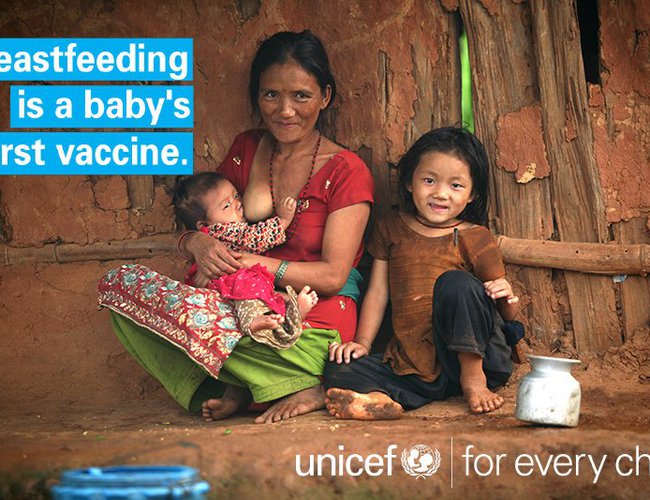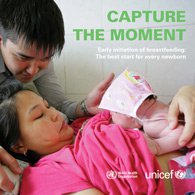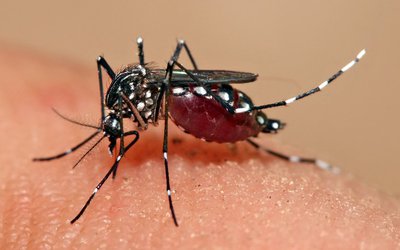
An estimated 55 babies out of 100, in Nepal, are breastfed within the first hour of their life. However, the remaining number of babies are not being breastfed within the first hour, putting them at a higher risk of death and disease and making them less likely to continue breastfeeding, says UNICEF and WHO in a new report.
“The estimation of babies worldwide, not being breastfed within the first hour, is 78 million – or three in five – and most of these babies are born in low and middle-income countries,” reports UNICEF.
According a new UNICEF and WHO report Capture the Moment: Early initiation of breastfeeding – the best start for every newborn, the newborns who are breastfed within the first hour of life are significantly more likely to survive. Even a delay of a few hours after birth could pose life-threatening consequences. Skin-to-skin contacts along with suckling at the breast stimulate the mother’s production of breast milk, including colostrums, also called the baby’s ‘first vaccine’, which is extremely rich in nutrients and antibodies.
“When it comes to the start of breastfeeding, timing is everything. In many countries, it can even be a matter of life or death,” says Henrietta H. Fore, UNICEF Executive Director. “Yet each year, millions of newborns miss out on the benefits of early breastfeeding and the reasons – all too often – are things we can change. Mothers simply don’t receive enough support to breastfeed within those crucial minutes after birth, even from medical personnel at health facilities.”

Breastfeeding rates within the first hour after birth are highest in Eastern and Southern Africa (65 per cent) and lowest in East Asia and the Pacific (32 per cent), the report says. Nearly 9 in 10 babies born in Burundi, Sri Lanka and Vanuatu are breastfed within the first hour. By contrast, only two in 10 babies born in Azerbaijan, Chad and Montenegro do so.
According to the Nepal Demographic and Health Survey 2016, the initiation of breastfeeding within the first hour of life is highest in Province 7 (70.7 per cent) and lowest in Province 2 (45.3 per cent). Nearly half of the babies born in Province 2 receive non-breast milk feedings during the first three days of their life, such as honey, water and milk. This is six times more than in Province 7.
“Breastfeeding gives children the best possible start in life,” says Dr Tedros Adhanom Ghebreyesus, WHO Director-General. “We must urgently scale up support to mothers – be it from family members, health care workers, employers and governments, so they can give their children the start they deserve.”
Capture the Moment, which analyzes data from 76 countries, finds that despite the importance of the early initiation of breastfeeding, too many newborns are left waiting too long for different reasons, including:
- Feeding newborns food or drinks, including formula: Common practices, such as discarding colostrums, an elder feeding the baby honey or health professionals giving the newborn a specific liquid, such as sugar water or infant formula, delay a newborn’s first critical contact with his or her mother.
- The rise in elective C-sections: In Nepal, caesarean section rates nearly doubled between 2011 and 2016, increasing from 4.6 per cent to 9 per cent. Less than one-third babies born by C-section were breastfed in the first hour after birth, compared to about two-thirds babies born by natural delivery.
- Gaps in the quality of care provided to mothers and newborns: The presence of a skilled birth attendant does not seem to affect rates of early breastfeeding, according to the report. In Nepal between 2006 and 2016, deliveries at health institutions grew by 39 percentage points (from 18 to 57 per cent), while early initiation rates increased by 20 percentage points (from 35 to 55 per cent). In many cases, babies are separated from their mothers immediately after birth and guidance from health workers is limited.
According to a press release issued by UNICEF, earlier studies, cited in the report, show that newborns who began breastfeeding between two and 23 hours after birth had a 33 per cent greater risk of dying compared with those who began breastfeeding within one hour of birth. Among newborns who started breastfeeding a day or more after birth, the risk was more than twice as high.
The report urges governments, donors and other decision-makers to adopt strong legal measures to restrict the marketing of infant formula and other breastmilk substitutes. In Nepal, The Mother’s Milk Substitutes (Control of Sale and Distribution) Act, 1992, aims to provide safe and adequate nutrition to the infant by protecting and promoting the practice of breastfeeding, whilst regulating breast milk substitutes as well as the sale and distribution of infant foods.
The WHO and UNICEF-led Global Breastfeeding Collective also released the 2018 Global Breastfeeding Scorecard, which tracks progress for breastfeeding policies and programs. In it, they encourage countries to advance policies and programs that help all mothers to start breastfeeding within the first hour of their child’s life and to continue as long as they want.
- Supreme Court upholds appointment of 52 officials
- Jul 03, 2025
- Weather Forecast: Generally Cloudy In The Hilly Areas With Heavy Rainfall In Some Areas Of Bagmati And Koshi Province
- Jul 03, 2025
- MCA-Nepal Welcomes Continued U.S. Support for MCC Nepal Compact Implementation
- Jul 02, 2025
- Sutlej to sell electricity from Arun III to Uttar Pradesh
- Jul 02, 2025
- PHDCCI India-Nepal Centre Organises “India-Nepal Fintech Summit 2025” In New Delhi
- Jul 02, 2025















